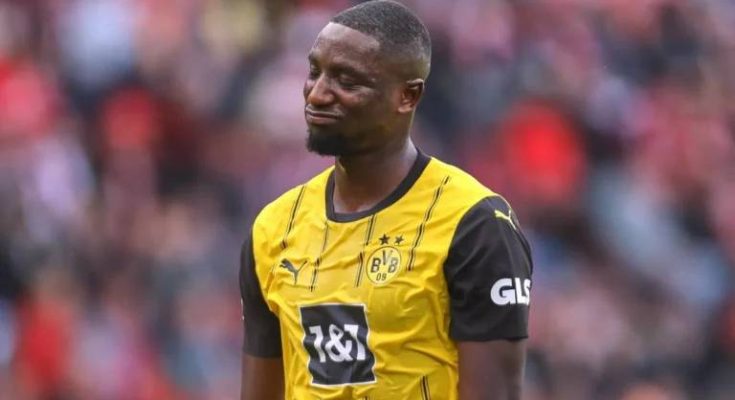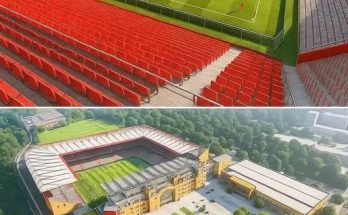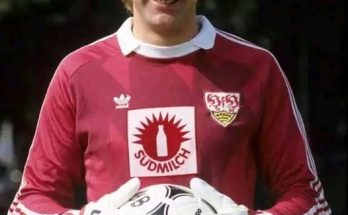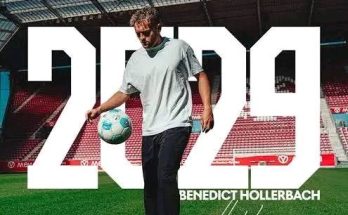It was supposed to be another chapter in Serhou Guirassy’s blossoming story at Borussia Dortmund — another match to add to his streak, another opportunity to fire in goals, another chance to carry the hopes of fans. Instead, the news broke like a storm: Guirassy has been suspended for two matches. For a club whose attack has been electrified by his presence, for a player riding a fine run of form, this is more than a blow — it’s a jolt to the expectations, the momentum, and the morale.
The first reaction from within the Dortmund camp was stunned silence. This was not an injury, not a tactical rest, not some manageable concern: this was absence imposed by authority. To be told that your spearhead cannot lead the attack for the next two games is to see a key pillar removed from the edifice mid‑match. The club’s medical team, coaching staff, and sports directors entered crisis mode almost instantaneously, trying to absorb the impact and figure out how to respond. The legal fine print of the ban was dissected; appeals were considered; internal consultation with the league and disciplinary body began immediately. The expectation among many was that Dortmund would fight it — but already, the damage was done: two fixtures without the man who has become the linchpin of their forward thrust.
That loss extends beyond mere numbers on a team sheet. In recent weeks, Guirassy has been more than just a goalscorer — he has been the face of Dortmund’s resurgence in attack, the constant threat defenders fear, the one who drifts across the final third, mixing power, timing, movement, and sheer predatory instinct. Match after match he has found ways to unlock defences, stretch lines, and serve as the hub around which attacks orbit. To lose him is to lose the gravitational pull of the offense, and the consequences ripple through the entire squad.
Given his impact this season, the absence may echo in the results as much as it does in morale. Dortmund’s ambitions are high: challenge for the Bundesliga title, make noise in Europe, sustain consistency in all competitions. But two matches without Guirassy create a vacuum in scoring potential, and the burden shifts to others. Will Adeyemi, Brandt, Beier or the more peripheral options be able to fill the gap? That is the gamble now. Will the team become more cautious, more conservative in attack to compensate? Will Kovac adjust formation or philosophy to compensate? The answers will be scrutinized in the coming days.
From the player’s vantage, too, this is hard. Guirassy is in the prime phase of his career — his confidence high, his rhythm sharp, his name on lips as one of the most dangerous strikers in the league. To be sidelined not by injury but by ban is a bitter pill. He will watch from the sidelines, train, keep sharp, but the on‑pitch momentum halts. And there is a psychological toll: the knowledge that you’re barred, that you can’t immediately influence outcomes, that you must trust others to carry forward what you built. The pure frustration of wanting to play, to contribute, to score, and being unable to — that weighs more heavily than many might imagine.
Across the club, there will be messaging to fans and the media designed to maintain calm. “This is part of football,” the official statements may say. “We will adjust. The team is deep. We trust in those who will step up.” But fans, ever eager for success, will press, will criticize, will wonder whether the disciplinary mechanism was fair, whether Guirassy was treated harshly, and whether the club should have done more to prevent this from happening.
The opponents in those two matches now see an opening, a window. To face Dortmund without Guirassy is less terrifying; defenders can plan differently, press higher, gamble more, knowing the principal danger man is unavailable. The tactical landscape shifts. Dortmund’s rivals will sense opportunity — to exploit hesitancy, to snatch points, to reduce the psychological edge Dortmund might carry.
The timing is also cruel. The fixture list does not pause. The season is relentless. Matches keep coming, and the pressure does not ease. To miss two games is to incur a burden: the need to recover lost ground, the hope that when Guirassy returns the rhythm can be restored swiftly, and the fear that the momentum he helped build might be derailed. Every day of the suspension matters, because it is one fewer chance to score, one more practice session where he is not inside match adrenaline, and one step of momentum ceded to rivals.
Within the dressing room, the dynamic shifts. Guirassy is not merely a star; he is a presence, a player around whom others orbit. His absence forces reorganization: who leads the line? Who takes on the responsibility? Will others take more risk, or will the team become more cautious to compensate? How will morale hold up when the team misses chances that perhaps Guirassy would normally convert? There may be whispered doubts: “if only he were here.” The coaching staff will need to manage not just tactics, but mental well‑being, maintaining unity, motivation, and belief even without their talisman.
It’s also worth considering how the ban came about. A disciplinary sanction suggests an infraction, perhaps a conduct issue, dissent, unsporting behavior, or violation of rules. Whatever the cause, it raises questions about judgment, temperament, and discipline. The club may face pressure to clarify exactly why Guirassy was penalized — was it a moment of frustration, a misstep, an isolated incident, or something systemic? The optics matter: for a high‑profile player, how one conducts oneself under pressure is as much talked about as goals and assists.
Meanwhile, media outlets will dissect everything: was the punishment too harsh? Did the league overreach? Was Guirassy treated fairly? Did his stature influence the severity? Will Dortmund appeal? The narrative war begins. Fans on forums will debate, some defending Guirassy, others arguing that no one is above the rules. Pundits will opine whether this will define his season, whether it might stall a dream run, whether it could tarnish his reputation. Over time it will fade, but the opening days will see a flurry of commentary.
For Dortmund’s management, this is a test of resilience. They must contain fallout, protect team confidence, adjust strategy, communicate clearly, and ensure that the disruption does not cascade. The strength of a squad is not just its starting XI, but its capacity to absorb shocks. Now Dortmund will be judged on how well they cope without their star. If they can win or at least not lose those matches, they will emerge stronger; if they falter, the cost may be severe.
Once Guirassy returns, there will also be questions: will he pick up where he left off? Will there be rust? Will his confidence be dented by the absence? Or will he come back hungrier, sharper, more determined to make up for lost time? The first match after the ban will be crucial — not just for results, but for symbolism. A goal early, a strong performance, could signal that the team remains unstoppable. But a limp return would amplify concerns.
This moment is one of uncertainty. Two matches are fixed — and then the season continues. Whether this suspension becomes a mere hiccup or a turning point depends on how Dortmund respond. Will they find alternative ways to score? Will the supporting cast step up? Will the defense be more robust to compensate? Will the coach adapt the system? All these decisions now carry extra weight.
For Guirassy himself, this is adversity. He must remain focused, disciplined, and mentally sharp. He must resist frustration, stay connected to the team, train as though preparing for battle, and be ready to reinsert himself seamlessly when permitted. His reputation, his trajectory, and even his market value may all be under subtle threat now. But if he handles it well, this could become part of his character — a demonstration of resilience rather than weakness.
From a fan’s perspective, the mood is bitter sadness. Supporters who filled stadiums chanting his name, lived for every run he made, celebrated when he scored — now see him forced to watch. The excitement dims. The anxiety rises. In conversations with friends, in social media, in club forums, the question echoes: can we survive this without him? The emotional connection the fans have with Guirassy makes his absence more than tactical — it feels personal. For many, the hope is that this is a short interruption, not the start of a deeper disruption.
In the larger narrative, this incident becomes a subplot in the season. When looking back in months’ time, observers will ask: Did the ban mark a turning point? Did Dortmund lose critical points during this period? Did it alter momentum? Did Guirassy’s absence cost them titles or European ambitions? Or will it be a footnote, quickly forgotten in a run of dominance?
Already, rival clubs may mark this window on their calendars. Their scouts, their strategists, their fans — all will see this as a chance to exploit weakness. Dortmund’s sense of invincibility is challenged. The aura of inevitability that comes with having a lethal striker is dimmed slightly. The psychological advantage Guirassy brings is softened by his absence. In tight matches, in moments of indecision, teams may press harder, believe more, sense vulnerability.
If the next two matches are against tough opponents, the pressure intensifies. The fans will demand grit. The coach must summon tactical flexibility. The players must carry more responsibility. A slip — a draw, even a defeat — will amplify the pain of Guirassy’s absence. In a league where margins are fine, two lost points here, one defensive lapse there, could tilt the balance. The calendar is not kind.
Yet, this is also an opportunity for others to break free. For younger players to show promise, for backup strikers to stake claims, for midfielders to take on scoring responsibility. In adversity, sometimes new heroes emerge. The club hopes those who step in will seize the moment, not shrink from it. The collective must rally — the club must cohere without its star.
Furthermore, the ban tests the leadership: on the pitch, who commands? Off the pitch, who steadies the ship? The captains, the senior players, the coaching staff — all must assume more. The sense of togetherness is critical. In the next days, training sessions, team meetings, motivational talks must reinforce belief. The injury room is closed, but the mental injury must not take root.
In media interviews, Guirassy will likely express regret, acceptance, commitment. He will apologize to fans, vow to return stronger, insist that the team must and will manage. The club will emphasize unity and depth. They will highlight past resilience. They will avoid panic. But beneath the outward composure lies tension — this is a test.
The timing — early in the season — makes it tricky. There is still room to absorb the shock and recover. But not much margin for error. The mental momentum the team built, the league positioning, the confidence — all risk being eroded. Dortmund must act fast, respond decisively, and not let the narrative spiral into fear or doubt.
As the first matchday of his suspension approaches, the buildup will be electric. Pundits will preview how Dortmund will line up without him. Opponents will whisper of tactical adjustments. Fans will demand results. The club will be watching every detail — from set pieces to pressing patterns — to ensure they don’t lose control without Guirassy’s guiding hand.
When the second banned match passes, when the final whistle blows, Dortmund must emerge still strong, still in the hunt. Then the focus shifts to the day of his return. Will he stride back onto the pitch, greeted with roaring cheers? Will he wear the armband? Will he instantly connect with teammates as if no time passed? The weight will be on that moment — to confirm that the team’s engine has not stalled, that the season is not derailed, that Guirassy remains central.
In many ways, this is a crossroads. For Dortmund, for Guirassy, for the season. How they navigate this small storm could influence the trajectory. A strong response could even galvanize the squad, tighten unity, deepen resolve. A faltering one could sow doubt, erode momentum, raise questions about squad depth. For Guirassy, handling this with maturity, focus, resilience, and a strong comeback could define not just the season but his legacy at Dortmund.
Ultimately, though, football is played on the pitch. Theories and narratives matter less when the whistle blows. The question remains: can Dortmund produce results without their star? Can they steady themselves through adversity? Can they minimize the cost of those two matches? If they do, this episode may be remembered as a test they passed. If not, it may loom as one they couldn’t overcome.
But one thing is certain: with Guirassy banned, the club must act. Adapt. Fight. Lean on depth. Trust in commitment. Stay united. Because in those two games, the margin for error is slim, and the season’s direction might pivot not on brilliance, but on resolve



